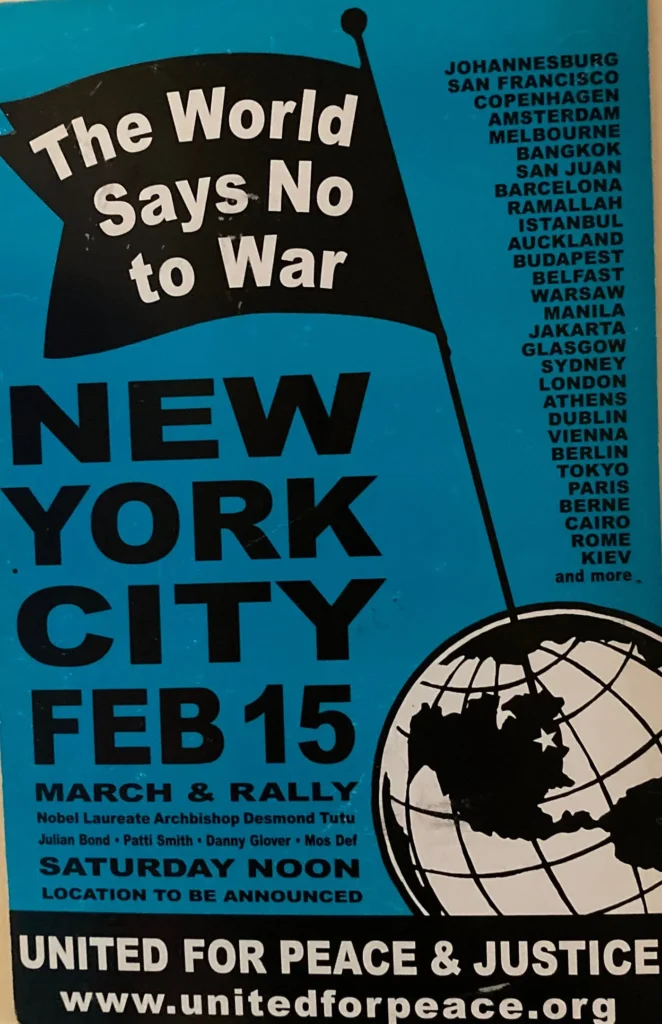Confessions of a Think Tank Junkie
TRANSCEND MEMBERS, 30 Oct 2023
Diane Perlman, Ph.D. | Substack - TRANSCEND Media Service
Expanding on Caitlin Johnstone’s Brilliant Analysis
Introduction – Riffing Off of Caitlin’s Piece[1]
25 Oct 2023 – I wish to compliment and complement Caitlin Johnstone’s Think Tanks Are Information Laundering Ops For War Profiteers[2] from my “Washington insider” perspective and deep interest in think tanks. She astutely describes how the “War Industry Supports More War.”
A think tank is usually just an institution in which scholars are paid by the rich and powerful to think up reasons why it would be good and smart to do something evil and stupid. One of the most depraved things that happens in the world today is the way war profiteering corporations and plutocrats are allowed to fund immensely influential warmongering think tanks, which then go on to influence the thinking of government policymakers in support of war and militarism. Media outlets like The Telegraph routinely cite these war profiteer-funded think tanks as experts on foreign policy and international affairs without ever disclosing this immense conflict of interest to their audiences; a recent study by the Quincy Institute found that 85 percent of the think tanks cited in the mainstream press when reporting on the war in Ukraine were funded by war profiteers like Lockheed Martin, Raytheon and Northrop Grumman.
I will reinforce Caitlyn’s analysis by describing my experiences in think tanks and observations of how the dominant theory of power politics cultivates beliefs in policies used to justify wars and military spending. This militaristic paradigm eclipses more constructive approaches, backed up by social science and conflict transformation, that address causes rather than symptoms and take a problem-solving, tension-reducing approach. This is similar to the way allopathic medicine dominates and shapes beliefs in treatments that eclipse knowledge of preventive, functional, naturopathic and regenerative medicine.
Concrete Thinking: Groupthink Mindset of the Washington Realism Policy Worldview
Caitlyn Johnstone describes how military-funded think tanks fuel government and media to promote wars, as the “War Industry Supports More War.” They manipulate false beliefs that drive support for official policies that provide rationales for military spending and wars.
The international relations (IR) theory of Realism pervades most think tanks and academic programs in international relations, political science, foreign service, history, and hence media and government. Realism theory emphasizes the exercise of power politics, known as “realpolitik” – an egocentric, one-sided, expansionist national policy, concerned with short-term, concrete, perceived interests of the nation, devoid of moral or ideological considerations. “It’s OK if they hate us as long as they fear us.” Never mind that people are more dangerous when afraid. It ignores how actions are experienced by the recipients of our policies and how they provoke escalatory unintended consequences. It refuses to address underlying dynamics.
Power politics is the only game in town. It generates an unshakeable hegemonic belief system that shapes minds, culture, institutions and systems. It is characterized by superficial, concrete, dualistic, black-and-white, us/them, zero sum thinking.
The Orwellian framing of the term Realism implies that other theories and theorists are unrealistic, naive and inferior. The Realism paradigm drives support for seemingly logical and necessary coercive policies. Threats, pressures, and punishments, like sanctions and deterrence, or when these fail, violent military action, are the best and only way to solve problems. If pressure doesn’t work, apply more pressure, then maximum pressure. “The only language they understand is force” is their mantra.
Policy wonks and students are seduced into belief systems that support policies that increase tension, provoke escalation, violence and unintended consequences (or perhaps they were intended hidden agendas).
Framing Power in Think Tank City
Over the years I have had students and think tankers live with me (otherwise I couldn’t afford to live in Dupont Circle, home to many of the world’s leading think tanks). They are all deeply entrained to think, eat, drink and sleep in the realism theory of power politics. Their most advanced thinking is called “Smart Power.”
First there was “Hard Power” – pressure and threats leading to violence. Then American political scientist Joseph Nye came up with the innovative concept of “Soft Power[3]”, “the ability to coopt rather than coerce,” using persuasion, culture and diplomacy to get them to want what we want them to want, and do what we want them to do without killing them.
When lovers of hard power criticized the effectiveness of soft power, they advanced the idea of “Smart Power.” Smart Power employs both carrots and sticks, still coercive in its way. It is humiliating and the way people treat donkeys.[4] “Smart power” is often proudly promoted as the best game in town.
There is an egocentric, mindless disregard for how interventions might be experienced, perceived or misperceived by adversaries. (See Mort Deutsch’s “Preventing Armageddon in the 21st Century”
Gripped by psychological ignorance, policymakers expect deterrence to work on others. They miss the irony of egomaniacal, self-righteous proclamations that “We will not be deterred.” (See my 2010 Op-ed, “Outside the Deterrence Box.”
The Law of Opposites
Provocative coercive approaches are experienced as frightening, enraging and humiliating. They back opponents into a corner with no graceful, face-saving way out. They escalate tensions and thereby increase volatility in the system. They can be used to create a pretext which becomes a prelude to war for which the Other is blamed. (We are peace-loving people. We tried. We had no choice. They made us do it…)
The Realists don’t analyze the causes of conflict from a variety of perspectives or offer creative solutions. Occasionally they give lip service to their false explanation of “root causes” like ancient ethnic hatreds or poverty which conveniently don’t implicate their policies.
I have long envisioned an enlightened think tank/policy institute based on interdisciplinary social science and conflict analysis to promote a shift to a survivable paradigm. It is like the difference between Newtonian and Quantum physics, between allopathic and regenerative medicine, between systems theories of “First Order Change” that address and suppress symptoms versus “Second Order Change” that address underlying systems and transform relationships. While each approach has a role, the solutions require an integrated approach including deep analysis of invisible forces.

My Life in Think Tanks
On September 11, 2001, I came in to DC from Philadelphia for an event at the Brookings Institution, the world’s leading think tank, on the failure of the Israeli/Palestinian Peace Process with diplomat, author and negotiator Dennis Ross.
The event abruptly ended with the announcement of the attack on the World Trade Center. We watched it on a TV monitor outside to the auditorium. I was shocked but not surprised, having expected and predicted a terrorist attack on our soil.[5] I thought, “Oh, so that’s how they did it.”
Two years later, when my children were grown, I moved to DC, hoping to do more good. I was horrified by the buildup to the cataclysmic invasion of Iraq – the psychological manipulation of fear and the justifications for war. I knew that the policies they were promoting would be catastrophic and have the exact opposite effect of what we were told.
I actively tried to prevent war, eventually realizing that it was a done deal. I went on the radio, wrote op-edsaccurately predicting the atrocities it would unleash, lobbied Senator Arlen Spector, marched with the world on February 15 in NYC, and with Code Pink in DC on March 8, 2003. I tried to organize an emergency warning press conference with Dr. Phil Zimbardo, then president of the American Psychological Association, and retired Admiral Eugene Carroll, director of the Center for Defense Information, who sadly died soon after, and others. The catastrophic fallout of the invasion of Iraq was predictable and preventable.
I moved to DC on September 8, 2003. I chose to live near the world’s leading think tanks in Dupont Circle, – Brookings, Carnegie, American Enterprise Institute, Middle East Institute, Hopkins School for Advanced International Studies (SAIS), Center for Strategic and International Studies (CSIS – most heavily funded by the defense industry), the Stimson Center, Institute for Policy Studies and more.
I have since attended a few thousand events and conferences at think tanks, universities, military organizations, National Defense University, Nongovernmental organizations (NGOs), on Capitol Hill, and beyond.
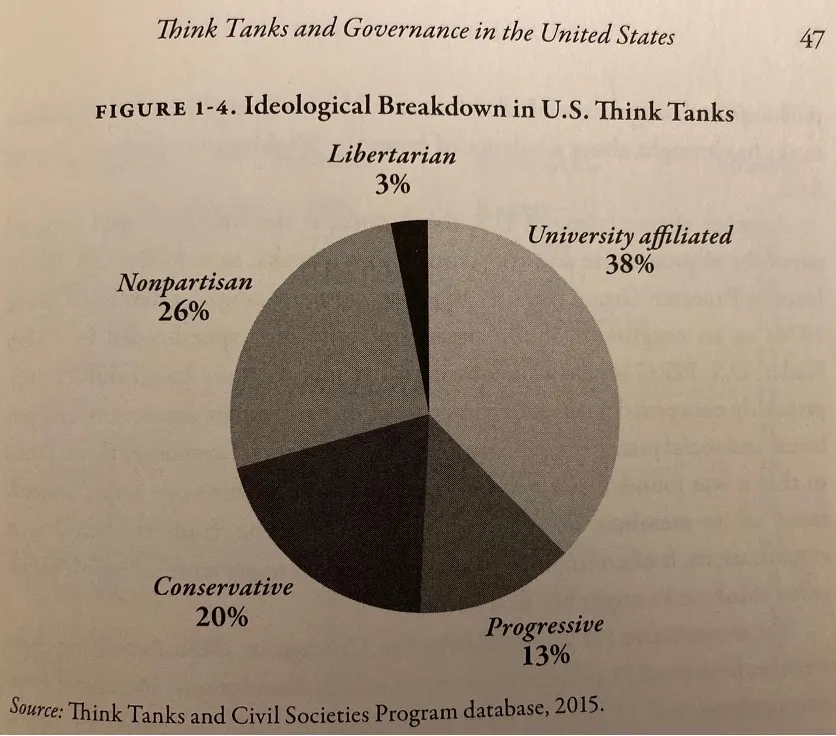
From the book, The Fifth Estate. For more current information see the 2020 Global Think Tank Index Report
The American Enterprise Institute, (AEI), the Center for Strategic International Studies (CSIS), the Atlantic Council, and The Heritage Foundation are among the most militaristic.
The Brookings Institution, regarded as the most prominent think tank, is considered nonpartisan.
The Carnegie Endowment for International Peace promotes diplomacy and nuclear arms control and holds a major nuclear policy conference every year.
The Stimson Center is among my favorites – more thoughtful, progressive, and post-partisan, address the nuclear issue.
The Institute for Policy Studies, where I have several friends, is perhaps the most left wing. One of its founders was Marcus Raskin, father of Maryland congressman Jamie Raskin.
I used to go more often to the New America Foundation when my friend Steve Clemons was Director of the American Strategy Program. Ann Marie Slaughter is the now CEO and Peter Bergen, who met Bin Laden and writes about terrorism, is Vice President.
The Middle East Institute gets funding from the United Arab Emirates, but also from Carnegie and the Ploughshares Fund.
Since moving to DC I have witnessed the births of several new think tanks created to cover new territory. The Center for American Progress, emerged during the Bush administration, triggering several major “Take Back America” conferences. It is deeply aligned with the Democratic Party.
The Center for a New American Security (CNAS), whose “mission is to inform and prepare the national security leaders of today and tomorrow” is not very new and entrenched in Realism theory of power politics.
The Quincy Institute for Responsible Statecraft, the most promising new kid on the block (quoted by Caitlyn), a post-partisan think tank, dedicated to a “fundamental rethinking of U.S. foreign policy assumptions,” to challenge the “overly militarized American foreign policy” to end endless wars.
The revolving door between think tank positions and government positions spins whenever the White House changes hands.
With far less funding and media presence, there do exist many organizations engaged in the nonviolent paradigm – 51 Think Tanks and Thought Leaders in Global Peacebuilding.
Different Strokes
Each think tank has its own perspective on current events, such as discussions about whether to approve of the 2015 Iran Nuclear Deal, JCPOA and the effectiveness of sanctions. Some think tanks encouraged the Iran Nuclear Deal while others fear-mongered against it. It had been intended to be a first step towards reducing tensions and improving relations, giving hope to many young Iranians with entrepreneurial spirits wishing not to be pariahs and to join global society.
There were different takes on the Nuclear Posture Review that came out after Trump tragically exited the hard-negotiated, historic, multilateral Iran Nuclear Deal.
“The Quadrennial Defense Review (QDR) is a legislatively-mandated review of Department of Defense strategy and priorities. The QDR will set a long-term course for DOD as it assesses the threats and challenges that the nation faces and re-balances DOD’s strategies, capabilities, and forces to address today’s conflicts and tomorrow’s threats.”
CSIS emphasized changes in policy to deal with the more dangerous “new threat environment” – the frame used to justify escalatory policies. The Stimson Center and Carnegie were more critical of Trump’s exit from the JCPOA.
After the historic passage of the UN Treaty for the Prevention of Nuclear Weapons (TPNW) or “Ban treaty” in July, 2017, some think tanks welcomed it as a breakthrough, analyzing complex aspects and what it meant, while others disparaged it, along with the US government who opposed it.
Although progressive think tanks push for better policies, many still use conventional thinking grounded in Realism theory.
Being a think tank junkie is a good way to learn in real time, to feel the vibes of current events and to meet people fact to face. Also, before Covid, lots of free lunch. Carnegie, the Washington Institute for Near East Policy and the Arab Gulf International had the best food.
Infiltrating Think Tank Events
In my early years I pushed myself to muster up the courage to ask questions and make comments which were different from others, like, “Don’t you think that policy might provoke escalation?” Think tank events revealed an unquestioning belief in deterrence theory as the one and only truth. I often brought up Robert Jervis’s work on spiral theory. Behaving according to deterrence theory counterproductively triggers spiral dynamics of escalation. Many remembered the work of Jervis, ignored for decades.
I mentioned the work of old friend and colleague, psychologist Ralph K. White, author of “Fearful Warriors.” People are more dangerous when afraid (as are we). When we act according to fear, we justify the fears of others and create a dynamic I call “Self-fulfilling paranoia.”
The madness that is carrying the world closer and closer to nuclear war has at its core a psychological explanation: Each side, though fundamentally afraid, misperceives the nature of the danger it faces. Each side imagines that it faces an inherently, implacably aggressive enemy, when it actually faces an enemy as fearful as itself – an enemy driven mainly by fear, to do the things that lead to war. Ralph K. White, Fearful Warriors.
Things were intense in 2015 leading up to the Iran Nuclear Deal, the Joint Comprehensive Plan of Action, (JCPOA). People often asked, “Are the sanctions working?” The answer would usually be, “Yes, our sanctions are hurting, biting and crippling,” presuming we must hurt them enough so they will do the right thing. I might say. “The fact that they are biting and crippling doesn’t mean they are working. They are harming innocent people who resent us. They are increasing extremism and fuel the popularity of hardliners. They are turning people against us.”
I mentioned a study of 100 cases of sanctions that failed 84 times. Sanctions are often used as a prelude to war.
Johan Galtung’s “naïve theory of sanctions” describes the belief that sanctions will cause people to see the light and turn against their leaders. Gripped by this illusion, they fail to notice that it doesn’t work. In psychology we call this “poor reality testing,” when the ego functions of perception, evaluation, and judgment of real, external factual events are colored by emotions, fantasies and internal representations.
My Dream of Enlightened Policy
Being a former clinical psychologist, having morphed into political psychology and the field of conflict studies, I long dreamt of starting a think tank that would promote a shift to a new, survivable paradigm. From my naïve point of view, U.S. policies provoked, rather than prevented violence.
“Speaking truth to power” was not enough. We need to “bring knowledge to power (K2P),” teaching ideas and bodies of knowledge capable of reversing cycles of violence. I didn’t realize that wars, described as “failures of imagination,” were not always failures, but “catastrophic successes.” Some demonstrated the wild success of what former CIA analyst and friend, Ray McGovern calls MICIMATT, the Military Industrial Military Industrial Congressional Intelligence Academia Think Tank Complex. This is the cycle whereby Congress funds wars which enrich the “Defense” industry, which fund Congressional campaigns. It has dominated American politics for generations.
Wars are advertisements for U.S. defense contractors (Boeing, Lockheed Martin, Northrup Grumman, Raytheon, TRW). Wars use up equipment and ammunition so they have to manufacture more, including next generation systems. Wars provide a distraction from domestic problems and serve many functions.
I wished to start something like a think tank grounded in interdisciplinary social science and conflict analysis, dedicated to developing sound policies based on a comprehensive analysis of underlying conflicts. It was not exactly a “think tank.” Maybe an “intuition tank.” I first called it “Conscious Politics Intuition Tank,” suggesting that U.S. politics was driven by unconscious forces. Carl Jung described consciousness is a work against nature – an “opus contra naturum.”
It would not fall on the left/right spectrum of think tanks, from the Institute for Policy Studies to the Heritage Foundation. It would be completely off the axis, a post-partisan “Meta Tank.” It would interact with, collaborate with and contribute new thinking to all think tanks and transcend partisanship.
The name Paragon Institute for Enduring Security came to me. We would strive for a model of excellence grounded in interdisciplinary, evidence-based social science to achieve “Cheaper, Deeper Security.” I imagined a “drop in think tank,” a period of time, a day or a week devoted to a challenging conflict, open to scholars and activists from all tanks, universities, NGOs and beyond to present constructive ideas, and to synergize on solutions in pursuit of a best-case scenario.
Think tanks tend to present “content,” typically in panels of four, often men in suits presenting their own perspectives. The “Paragon Lab” would emphasize process, functioning as a policy laboratory, collaborating on developing and designing formulas to transform conflicts, using elements from evidence-based strategies that work.
I was inspired by the work of many, including Johan Galtung, who turned 93 yesterday, my mentor and friend, father of peace studies and co-founder of Transcend International.[6] The son of a physician, he applies the model of Analysis, Diagnosis, Prognosis, and Therapy. He developed the “Transcend Method” of conflict transformation for creating a new, mutually beneficial, win-win reality. Conflict transformation is superior, more sustainable, and requires more creativity than conflict resolution, often superficial and based on compromise in which both parties are disappointed.
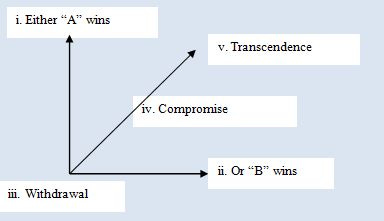
In my experience institutions are more interested in funding new research than in applying the results of research already done using knowledge we already have. We know enough now to design policies and interventions capable of reversing cycles of violence based on principles of
· Tension reduction
· Meeting basic human needs – including dignity, identity and personal sovereignty
· Addressing and correcting just grievances
· Identifying legitimate goals – such as safety, freedom, security, autonomy
· Finding creative ways to bridge seemingly incompatible legitimate goals by creating a new reality

The Transcend Method emphasizes identifying each party’s legitimate goals and creating a new reality that bridges these goals. (Note that there are illegitimate goals, including domination and control, which are often misrepresented as benevolent and must be exposed.)
In addition to Galtung’s work, there is a rich, brilliant body of knowledge from the 1980s and the height of the nuclear arms race that has been forgotten. Much of it is contained in Psychology and the Prevention of Nuclear War, edited by Ralph K. White. See the table of contents below to get an idea of the depth of thinking and the range of work we are ignoring.[7]
There is a palpable void in conceptualization that is entirely possible to fill. Many immersed in Realism Theory are receptive to these ideas when presented in ways that are self-evident once explained.
I imagine ways to integrate knowledge and experience from scholarship, academic study, and practical experience, and apply it to designing policies that address current events in real time. Academia is sadly fragmented into artificial silos, rendering knowledge inaccessible and unlikely to be utilized for effective, comprehensive problem-solving.
My Attempts at Cross-Fertilization Between Two Worlds
In 2009 I became a visiting scholar at George Mason School for Conflict Analysis and Resolution, now called the Jimmy and Rosalyn Carter School for Peace and Conflict Resolution. In 2018 I co-taught a course on think tanks with friend and colleague, Dr. Alan Gropman.[8] We used James McGann’s book, The Fifth Estate: Think Tanks, Public Policy, and Governance.
I met James McGann at an event at the Wilson Center presenting his annual report on think tanks. Here is the 2020 Global Go-To Think Tank Index Report, a project of the University of Pennsylvania, Think Tanks and Civil Societies Program.
During my thousands of hours in think tank events, I felt an excruciating, palpable void that seemed easy to fill. It is certainly doable. I unsuccessfully tried to get conflict analysts to show up, to contribute their knowledge and skills to the world of think tanks to foster solutions-oriented policies capable of transforming the underlying conflicts and reversing cycles of violence.
Social scientists from universities are increasingly being left out of the policymaking arena. As Harvard Professor Joseph Nye points out, “Scholars are paying less attention to questions about how their work relates to the policy world, and in many departments a focus on policy can hurt one’s career.” Instead, there is a much greater emphasis on theory. Although this can benefit the academic world, much of this theory is not readily accessible to politicians or others outside of the academy. Nye’s point is that scholars from departments of political science, security studies, and international affairs are no longer attractive to policymakers because they have become too arcane. Thus, the scholars at think tanks who are more policy relevant are gaining importance because they can fill the void left by universities and bridge the gap between the world ideas and power. From The Fifth Estate, James G. McGann
99% of the time I was the only psychologist/social scientist/conflict analyst raising questions that challenged the realism paradigm and presented alternative approaches. Sometimes people would come up to me to talk. Over time I learned not to introduce myself as a psychologist, and how and craft comments to evoke more thoughtful answers. Most people were very receptive to these ideas which are self-evident once described.
Progressive academics often whine and complain about how ignorant policymakers were when supporting destructive policies. The problem was not that they were ignoring us, but that there was nobody there to ignore.
I did organize a few events, especially when Johan Galtung was in town, like these:
11/13/2013– I organized an event at Carnegie covered by Washington Report On Middle East Affairs

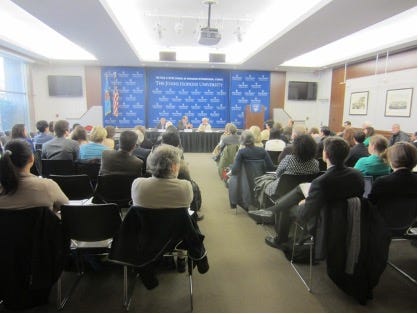
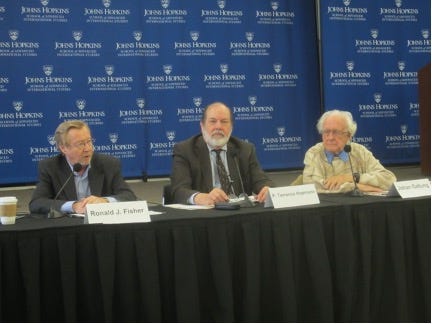
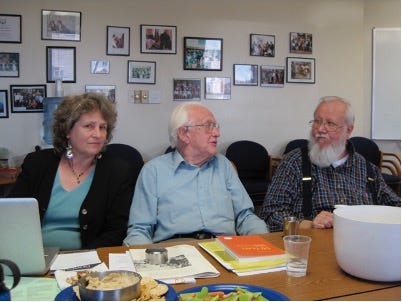

In Search of Partners
In 2019, before Covid, I began working with the Middle East Institute to create an interdisciplinary, social science, conflict transformation task force to collaborate on strategies to address the Middle East conflicts in a way that has never been done – psycho-political brain surgery. Unfortunately, due to disabling toxic environmental exposure (mold), my think tank efforts were disrupted. Needed now more than ever, I am looking for partners and institutions to convene the task force (I will publish more details about it) and to incubate the Paragon Institute for Enduring Security, as a project of Transcend US. Johan Galtung charged me and my dear friend and colleague, Marilyn Langlois, to develop Transcend US.
Gratitude
I have a special debt of gratitude to David Schonbrunn, who is my editor and sounding board. We connected through his helpful comments on my Substacks. Thanks to David my writing is better and more frequent. We should al be grateful to Substack for providing a platform for us to connect and develop community.
_____________________________________________
 Diane Perlman, PhD is a clinical and political psychologist, devoted to applying knowledge from psychology, conflict studies and social sciences to designing strategies and policies to reverse nuclear proliferation, to drastically reduce terrorism, reduce enmity, and to raise consciousness about nonviolent strategies for tension reduction and conflict transformation. She is a visiting scholar at the School for Conflict Analysis and Resolution at George Mason University, is active in Psychologists for Social Responsibility, the TRANSCEND Network for Peace Development Environment, and on the Global Council of Abolition 2000. Some of her writings can be found on her websites, www.consciouspolitics.org and www.SanityandSurvival.com. Email: dianeperlman@gmail.com
Diane Perlman, PhD is a clinical and political psychologist, devoted to applying knowledge from psychology, conflict studies and social sciences to designing strategies and policies to reverse nuclear proliferation, to drastically reduce terrorism, reduce enmity, and to raise consciousness about nonviolent strategies for tension reduction and conflict transformation. She is a visiting scholar at the School for Conflict Analysis and Resolution at George Mason University, is active in Psychologists for Social Responsibility, the TRANSCEND Network for Peace Development Environment, and on the Global Council of Abolition 2000. Some of her writings can be found on her websites, www.consciouspolitics.org and www.SanityandSurvival.com. Email: dianeperlman@gmail.com
Go to Original – coronawise.substack.com
Tags: Think tanks, War Economy
DISCLAIMER: The statements, views and opinions expressed in pieces republished here are solely those of the authors and do not necessarily represent those of TMS. In accordance with title 17 U.S.C. section 107, this material is distributed without profit to those who have expressed a prior interest in receiving the included information for research and educational purposes. TMS has no affiliation whatsoever with the originator of this article nor is TMS endorsed or sponsored by the originator. “GO TO ORIGINAL” links are provided as a convenience to our readers and allow for verification of authenticity. However, as originating pages are often updated by their originating host sites, the versions posted may not match the versions our readers view when clicking the “GO TO ORIGINAL” links. This site contains copyrighted material the use of which has not always been specifically authorized by the copyright owner. We are making such material available in our efforts to advance understanding of environmental, political, human rights, economic, democracy, scientific, and social justice issues, etc. We believe this constitutes a ‘fair use’ of any such copyrighted material as provided for in section 107 of the US Copyright Law. In accordance with Title 17 U.S.C. Section 107, the material on this site is distributed without profit to those who have expressed a prior interest in receiving the included information for research and educational purposes. For more information go to: http://www.law.cornell.edu/uscode/17/107.shtml. If you wish to use copyrighted material from this site for purposes of your own that go beyond ‘fair use’, you must obtain permission from the copyright owner.
